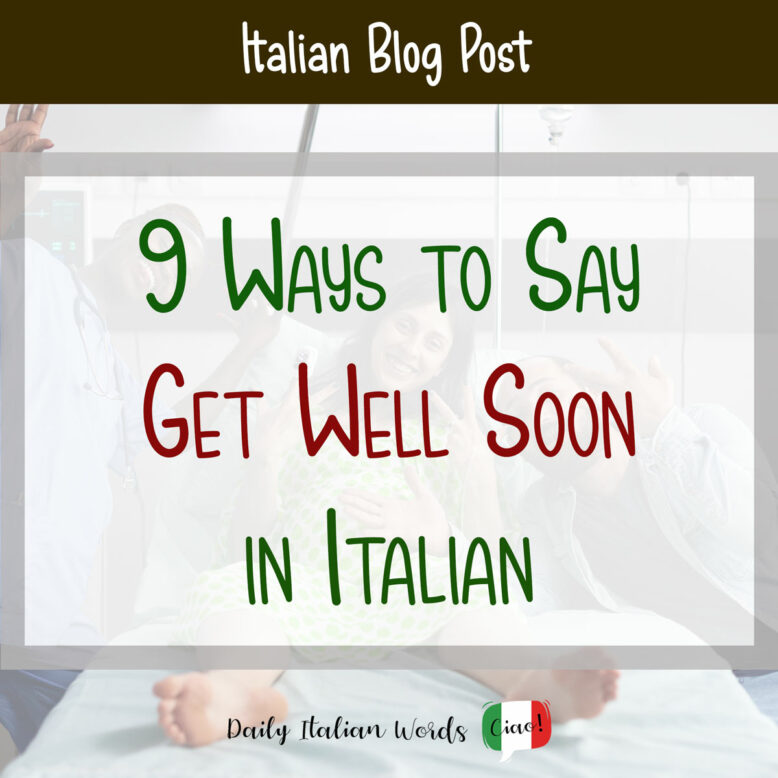Did your Italian colleague just call in sick? Or maybe your nonna isn’t feeling her best? When someone you know isn’t well, sending a thoughtful message can work wonders —and saying “get well soon“ in Italian adds an extra touch of care.
To help you spread some good vibes, here are 9 simple phrases you can use to wish your Italian friends, family and acquaintances a speedy recovery, along with tips on when to use each one.

1. Guarisci presto!
Literally: Heal yourself soon
First on the list is the classic Guarisci presto! It’s simple, cheerful, and gets straight to the point—the perfect phrase to show that you genuinely hope a friend, family member, or close coworker feels better soon. To add an extra touch of enthusiasm or concern, just throw in a mi raccomando, which is like saying, “I really mean it.”
Ho sentito che ti sei presa l’influenza. Mi raccomando guarisci presto che il mare ci aspetta!
I heard you caught the flu. Please get well soon, the beach is waiting for us!
If you’re speaking to your boss or someone you don’t know well, you can make this phrase formal by using the present subjunctive form, which is the way to express the imperative with the polite Lei: Guarisca presto! This small change keeps things respectful while still expressing your heartfelt wishes.
2. Rimettiti presto!
Literally: Recover soon!
An equally popular way to say “get well soon” in Italian is Rimettiti presto! It’s warm and informal, making it another great expression to encourage someone you care about to feel better. This phrase is based on the reflexive verb rimettersi, which typically means “to recover” but, in other contexts, can also mean “to wear again.”
Vedi di rimetterti presto, abbiamo una partita di calcetto in sospeso!
Make sure to recover quickly, we’ve got a soccer match on hold!

3. Spero che tu guarisca / ti rimetta presto
Literally: I hope you recover soon
This phrase is a bit more formal than the previous ones, but still casual enough to be warm and personal. It’s perfect for emails or messages to colleagues or acquaintances, conveying a thoughtful tone that’s both caring and professional.
It’s especially thoughtful if someone has been dealing with a longer illness or absence, as it expresses both sympathy and encouragement for their recovery.
Ho appena saputo dell’incidente. Spero che ti rimetta presto, fammi sapere se hai bisogno di qualcosa.
I’ve just heard about the accident. I hope you recover soon, let me know if you need anything.
4. Auguri di pronta guarigione
Literally: Best wishes for a speedy recovery.
This is still a nice, kind phrase to say “get well soon” in Italian, but it sounds a bit more formal. We commonly use it in emails or cards to colleagues, clients, or anyone we don’t have a close personal relationship with. It works great for sending a supportive message while maintaining a respectful tone.
Ho saputo della sua operazione. Le faccio i miei migliori auguri di pronta guarigione.
I heard about your surgery. I send you my best wishes for a speedy recovery.
5. Ti auguro una pronta guarigione!
Literally: I wish you a speedy recovery
This is a more informal version of the previous phrase, perfect for when you’re speaking to someone you use the informal tu with, rather than the formal Lei. While it’s friendly, it’s still polite enough to use in a workplace setting, giving your message that personal, warm touch. Again, we typically use it in written communication like cards or emails.
Mi dispiace molto per il tuo infortunio, ti auguro una pronta guarigione.
I’m really sorry about your injury, I wish you a speedy recovery.

6. Ti auguro di stare meglio presto!
Literally: I wish you feel better soon!
This phrase works well when a friend is not just physically unwell, but also going through an emotional or difficult time. Whether it’s dealing with a personal crisis, a break-up, or just feeling down, it shows that we genuinely care about their overall well-being and want them to feel better.
So che stai passando un momento difficile, ti auguro di stare meglio presto. Se hai bisogno di parlare, sono qui!
I know you’re going through a tough time, I hope you feel better soon. If you need to talk, I’m here!
7. Rimettiti in sesto!
Literally: Put yourself together soon.
Rimettiti in sesto! is similar in meaning to Ti auguro di stare meglio presto!, but it’s much more informal and laid-back. We use it to cheer someone on as they recover from an illness like the flu, deal with emotional challenges, or tackle life’s more practical struggles like financial issues.
Rimettiti in sesto… la squadra ha bisogno del suo capitano!
Get it together… the team needs its captain!
8. Fatti forza, ti sono vicino/a!
Literally: Make yourself strong, I am close to you!
This phrase is full of empathy and encouragement. It’s more than just wishing someone well, it’s about making them feel truly supported. Whether they are facing a serious illness or going through a difficult time in their life, it reminds them they can count on us on their road to recovery.
So che non è un momento facile, ma fatti forza, ti sono vicino. Conta su di me per qualsiasi cosa!
I know this isn’t an easy time, but be strong, I’m here for you. Count on me for anything!
9. Prenditi tutto il tempo di cui hai bisogno, la tua salute viene prima di tutto
Literally: Take all the time you need, your health comes first.
This last way of saying “get well soon” in Italian is a great reminder that recovery is a process and everything else can wait. We typically use it toward someone feeling pressured by work, responsibilities, or simply not being their usual active self. It reassures them that it’s okay to take things slow and prioritise what matters most—their health and well-being. This expression is especially considerate in professional settings or for friends who tend to stress about “falling behind” in their daily life.
Non preoccuparti di nulla qui al lavoro. Prenditi tutto il tempo di cui hai bisogno, la tua salute viene prima di tutto.
Don’t worry about anything here at work. Take all the time you need, your health comes first.


Valentina Nicastro is a travel writer in love with her home country, Italy. Having travelled widely around the globe, she realised there was more to explore closer to home and decided to put the passport aside for a while. When she is not immersed in documenting Italy, you’ll find her donning her communication consultant hat, weaving words as a content writer and bridging linguistic divides as a translator.


